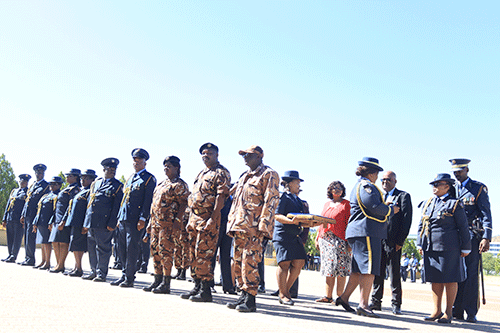The newly-created position of senior inspector will cost the Namibian Police at least N$18,9 million a year for the promoted officers.
The position comes with a salary scale between N$337 983 and N$403 922 a year. The average is N$370 953. If the average is multiplied by 51 - the number of
beneficiaries - it results in N$18.9 million a year. “The new rank of senior inspector is at grade six with a salary scale of N$337 984 – N$403 922. The introduction of the new rank will be done in phases. The first phase has benefited about 51 members, and the second phase will resume in the next financial year,” deputy inspector
general for administration, major general Anne-Marie Nainda said upon enquiry.
The new rank was necessitated by the pay disparity that exists between the position of inspector and chief inspector.
“As you may recall during the tenure of my predecessor, lieutenant general (retired) Sebastian Haitota Ndeitunga, the management of the Namibian Police Force presented its concern to our political leadership of the ministry over the gap that existed between the salary notches of chief inspector (at grade five) and that of inspector (at grade seven),” police boss Joseph Shikongo said during Friday’s parade on the promotion and conferment of ranks.
At the moment, a police inspector takes home anything between N$277 000 and N$330 000 annually, while the chief inspector collects between N$412 000 and N$500 000 a year.
“The salary gap came to being after the job evaluation exercise conducted in 2013, whereby the notch of chief inspector was re-graded from grade six to grade five. The re-grading, although good as it was, resulted in the gap between the salary grades of chief inspector and inspector,” Shikongo recalled.
“To this end, and fortunately, the honourable Minister of Home Affairs, Immigration, Safety and Security (MHAISS) Albert Kawana and his predecessor Frans Kapofi did not take our concerns lightly. Hence, they took up the matter with central government, whereby an approval to close the gap was given, and a directive to prioritise the closing of the said gap,” he continued.
Subsequently, Kawana directed Shikongo and his management team to work on the structure and modalities towards the end of 2022 to ensure the closing of the gap. “I, therefore, wish to emphasise that while government continues to play its role in providing the necessary resources through budgetary allocations, it is the duty of all of us to ensure that we complement what the government is doing by redoubling our efforts to deliver policing services,” the police supremo stated. “It is also important to stress that members of the Force are promoted in recognition of their commitment and dedication to national duties. Therefore, a promotion should not be seen as a mere decoration and/or just a reward to an officer or a member, but it comes with huge responsibilities over their shoulders, which includes a high level of accountability, commitment and honesty”, he noted. As such, the Force introduced the new rank on Friday to close the N$14 000 monthly difference between the two senior ranks.
“I am pleased to inform you that we have now commenced with the implementation of the new Force structure, whereby a total of 51 members from all the regions have been promoted to the rank of senior inspectors, effective 1 March 2023,” Shikongo said.
Out of this number, 20 are “B” class police station commanders, seven are criminal investigations unit commanders, and 24 are Special Field Force units and posts commanders.
“However, due to the distance away from some regions, I will only confer the rank insignias to 23 officers from the nearby stations and units in the Erongo, Omaheke, Otjozondjupa, Hardap and Khomas regions, whereas the remaining will be conferred by their respective regional commanders,” Shikongo added.
Last year, when the now-implemented rank was just a concept in the police corridors, it was met with consternation in certain quarters.
Some felt that junior officers at the bottom of the police chain who barely make enough to make ends meet should have
their employment conditions improved, rather than introducing a new rank.
Those who were against the new rank said “it will demoralise the junior members, and will kill our operations. It will also cost the public a lot of money”.
To cater for the new position, additional costs to the already-drained State purse will be incurred to buy new uniforms, police badges and designs as well as salaries, they said at the time.
“They always tell us that they care for the junior-ranked members of the Force. Why don’t they take a bottom-up approach to close the salary gap? When we demand an increment, we are told ‘there is no money’. So, where is the money going to come from for this position?” a police officer asked at the time. However, Nainda said the new post will have a ripple-effect on the entire force.
“The improvement of the pay for junior officers is equally linked to promotions. [The] promotion of senior inspector has a gradual chain reaction of promotion to all other lower ranks,” she observed.
Underpaid, overworked
At the bottom of the police’s food chain are the constables, the lowest-ranked officers, who predominantly make up the police’s operations on crime prevention, or render other day-to-day services to the public at charge offices.
According to the current salary structure, the highest-paid constable earns N$123 000 per year. This amount is subject to taxation. When juxtaposed to a chief inspector’s earnings, the difference is a glaring N$377 000.


